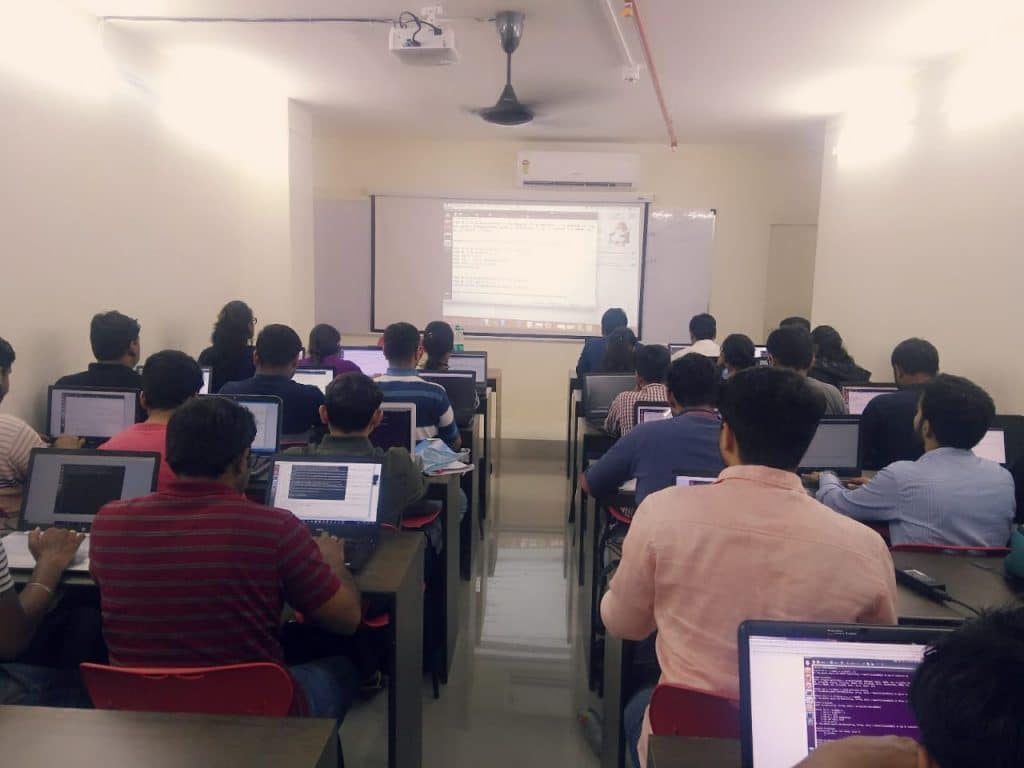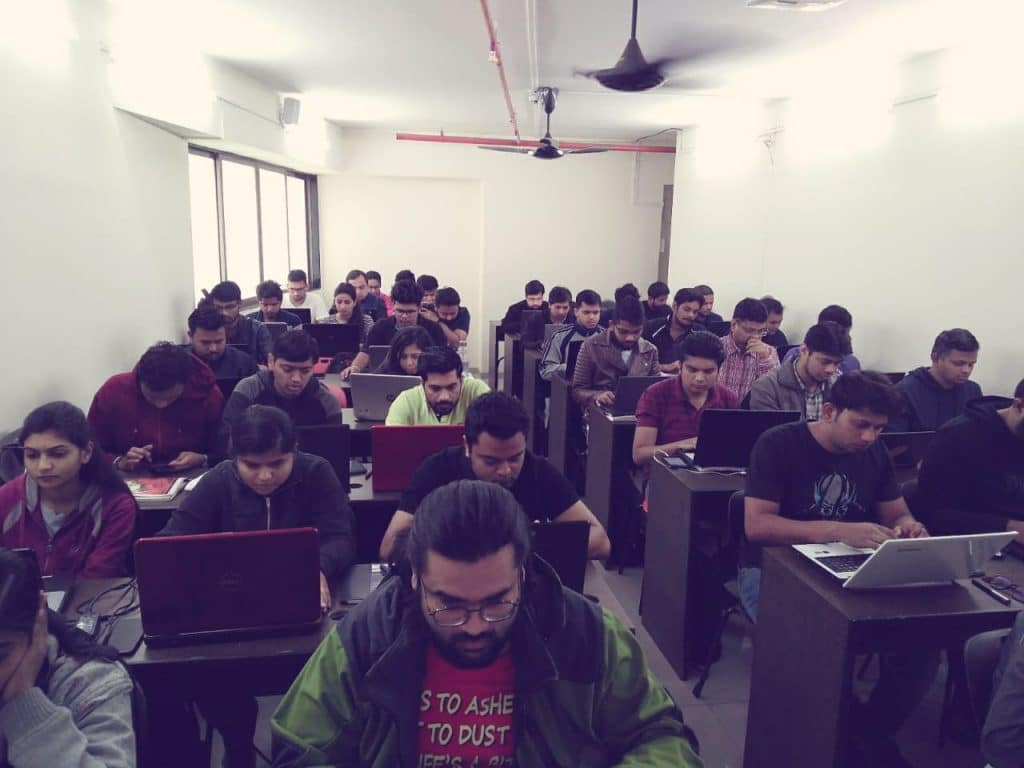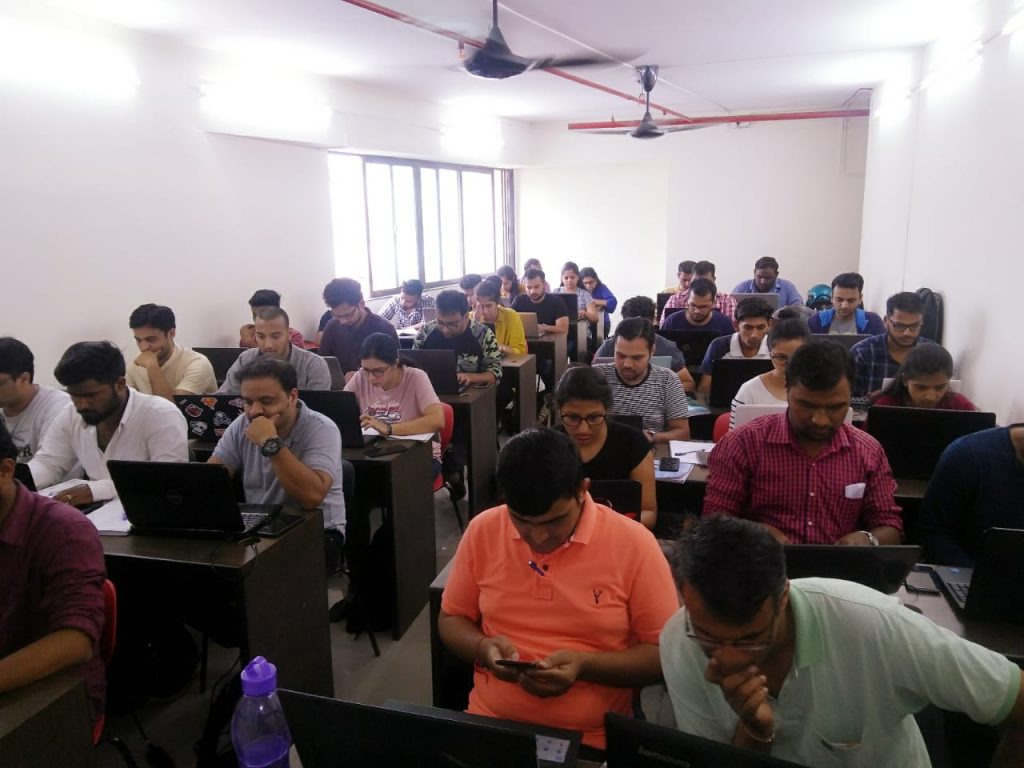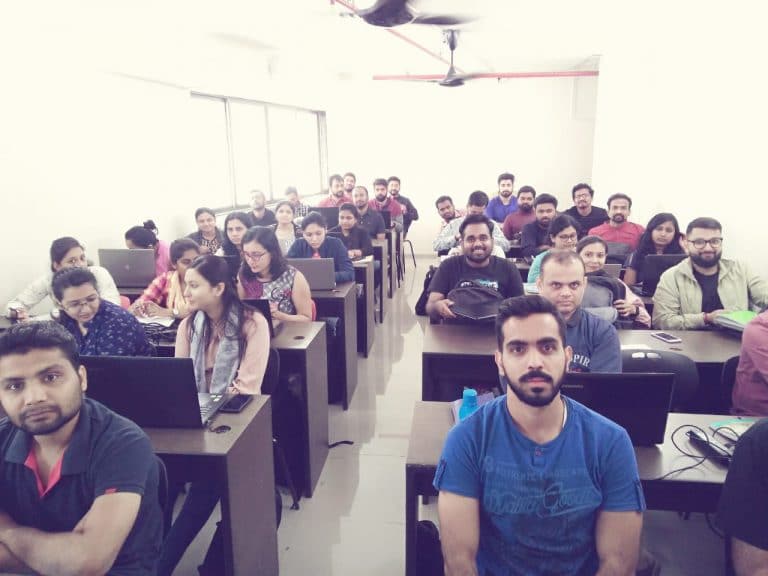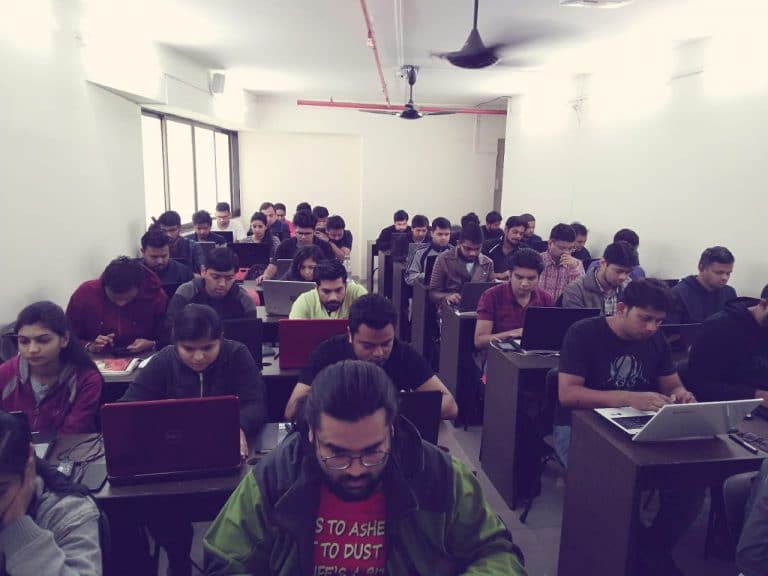Best Python Training Institute In Pune
- Created by Vaibhav Bajaj
- Last updated 11/2020
- 7,284 students enrolled
- Created by Vaibhav Bajaj
- Last updated 11/2020
- 7,284 students enrolled
- 7,284 students enrolled
Best Python Course In Pune
For Best Python Training Institute in Pune, you may enroll with us as it brings a training course in the widely acclaimed programming language Python, designed primarily for the budding programmers who wish to make it big in the Data Analytics Domain. Python is a high-level programming language with its powerful library, clear syntax, and high readability has emerged as one of the “must-know” languages. The Python course at ETLhive is intended to impart knowledge on the basic and advance conceptual frameworks of Python which includes an in-depth understanding of sequence and file operations, machine learning, python scripts, functions in python, web scraping etc. This python training course is ideal for programmers as it provides a helpful insight into debugging programming errors, therefore ensuring better programming abilities. Further, there are elaborate lectures on the importance and usage of Machine Learning and Scientific Computing and a hands-on training about setting up Python Environment.
Who should opt for Python
Software Professionals such as Programmers, Web Developers, ETL Developers, Analytics Professionals, Automation Engineers, Hadoop Programmers, Project Managers, and even beginners must Learn Python to compete well and to ensure their success in the IT sector.
Pre-requisites for Python Course
Anyone having a basic knowledge of Windows or UNIX can apply for python classes. An additional knowledge about programming will ensure faster learning and implementation in the real-time projects.
Syllabus
- Defining Python
- History of Python and its Growing Popularity
- Features of Python and its Wide Functionality
- Python 2 vs Python 3
- Setting Up Python Environment for Development
- What and How of Python Installation?
- IDEs: IDLE, Pscharm, and Enthought Canopy
- Running a Python Script
- Writing First Python Program
- Python Scripts on UNIX and Windows
- Installation on Ubuntu-based Machines
- Programming on Interactive Shell
- Python Identifiers and Keywords
- Indentation in Python
- Comments and Writing to the Screen
- Command Line Arguments and Flow Control
- User Input
- Essentials of Hadoop
- Python Core Objects
- Defining Built-in Functions
- Objectives
- Variables and their types
- Variables – String Variables
- Variables – Numeric Types
- Variables – Boolean Variables
- Boolean Object and None Object
- Tuple Object and Operations
- Dictionary Object and Operations
- Types of Variables – Dictionary
- Comparision of Variables
- Dictionary Methods and Manipulations
- Operators and Logical Operators
- Data Structures and Data Processing
- Arithmetic Operations on Numeric Values
- Operators and Keywords for Sequences
- Understanding Conditional Statements
- Break Statements and Continue Statements
- Using Indentations for defining if & else block
- Loops in Python
- While, Nested, Demo-Create
- How to Control Loops?
- Sequence and Iterable Objects
- Objectives of Functions
- Types of Functions
- Creating UDF Functions
- Function Parameters
- Unnamed and Named Parameters
- Creating and Calling Functions
- Python user Defined Functions
- Python packages Functions
- Anonymous Lambda Function
- Understanding String Object Functions
- List and Tuple Object Functions
- Studying Dictionary Object Functions
- Defining Python Inbuilt Modules
- Studying Types of Modules
- os, sys, time, random, datetime, zip modules
- How to Create Python User Defined Modules?
- Understanding Pythonpath
- Creating Python Packages
- init File and Package Initialization
- What and How of File Handling with Python?
- How to Process Text Files using Python?
- Read/Write and Append File Object
- Test Operations: os.path
- Overview of Object Oriented Programming
- Defining Classes, Objects, and Initializers
- Attributes – Built-In Class
- Destroying Objects
- Methods – Instance, Class, Static, Private methods, and Inheritance
- Data Hiding
- Module Aliases and reloading modules
- Python Exceptions Handling
- Standard Exception Hierarchy
- .. except…else
- .. finally…clause
- Creating Self-Exception Class
- User-defined Exceptions
- Debugging Errors – Unit Tests
- Project Skeleton
- Creating and Using the Skeleton
- How to use pdb debugger?
- Using Pycharm Debugger
- Asserting Statement for Debugging
- Using UnitTest Framework for Testing
- Understanding Regular Expressions
- Match Function, Search Function, and the Comparision
- Compile and Match, Match and Search
- Search and Replace
- What and How of Extended Regular Expressions?
- Wildcard Characters
- How to Create a Database using SQLite 3?
- Understanding CRUD Operations
- Creating Database Connection
- Python MySQL Database Access
- Operations: Create, Insert, Read, Update, Delete
- What are DML and DDL Operations?
- Performing Transactions
- How to Handle Database Errors?
- What and How of Disconnecting Database?
- Machine Learning with Python
- Defining Machine Learning
- Implementation of Machine Learning
- Algorithms
- Learning NumPy and Scipy
- Learning – Supervised or Unsupervised
- Supervised, Unsupervised Learning and Classification
- Classification and k-Nearest Neighbours (kNN)
- Building, Testing, and Measuring the Performance of the Classifier
- Defining Clustering Problem
- k-Means Clustering
- Defining Panda
- Pandas – Creating and Manipulating Data
- How to Create Data Frames?
- Importance of Grouping and Sorting
- Plotting Data
- Understanding Scikit-Learn
- Algorithms for Scikit-Learn
- Understanding Parallelism
- What is Multithreading in Python?
- How to create threads with Parameters?
- Demon/Non-Demon Processes
- Studying Multiprocessing in Python
- Defining Hadoop
- Growing Popularity of Hadoop
- Understanding the nature of BigData
- What is Hadoop Ecosystem
- Data Analysis with Python
- Studying HDFS File System
- Cloudera Cluster of Single Node
- Hadoop and MapReduce Framework
- MapReduce Job Run and Python
- PIG, HIVE, and Python
- Package Installation using Pycharm
- pip and easy_install
- XLS Interface and XLS Parsing with Python
- Web Scraping in Python
- MrJob Package
- Beautifulsoup Package
- Concepts of Testing
- Need of automation
- Automation Frameworks Types
- UI Automation – Selenium Library
- Navigating
- Locating Elements
- Waits
- APIs Basics
- Types of APIs
- API AUTOMATION – Request Module
- UNIT TEST Framework-PYTHON
- Basic Test Structure
- Running Tests Cases
- Test Outcomes
- Assert Statements-Types
- Introduction to Test Fixtures
- Introduction to Test Suites
- Test Discovery with UNIT Test Framework
- Python Nose Framework
- Installation
- Running nose
- Nose fixtures
- Testing markdown.py
- Nose assert_equals
- Test discovery
- Running unittests from nose
- Running doctests from nose
- Integration of Nose with HTML
- Robot Framework-FrameWork
- Architecture
- Test Libraries
- Installation and Configuration of Robot Framework and Ride
- Suite Test Setup and Teardown
- Tags: Tags for individual Testcases, Force Tags for Suite Level
- Reports & Logs – Creating reports with customized file names
- Creating Reports with Specified Titles
- Write Keywords in RF actually implemented in Python scripts
- Web Development Django
- Django Introduction
- Installation and Setup
- Introduction to Django Framework
- Django Principles
- Install and create virtualenv
- Install Django and production ready setup
- Creating A New project
- Running the Development Server
- Django Apps
- URLs and Views
- URL Mapping — emphasis on Python regex
- HTTP protocol Fundamentals
- Django Views — render/HttpResponse Method
- Django Templates
- Static Files — CSS, JavaScript and Images
- Model, Template and View (MTV) Design Pattern
- Django Model Classes — SQL Mapping
- Field Types
- Generating Databases
- SQL Queries
- Manage.py Database Commands
- Django Admin Interface — superuser
- Implement __str__ for your Model Classes
- The Model API
- SAVE and Delete
- Adding Login and Logout Views
- A template for the Home Page
- Authorization with Django
- Overview of all HTML Elements
- CSS Overview
- Templates: Tags and Variables
- Adding the HOME View
- URL Mapping for APPS
- Template Inheritance
- Login required — Handling issues with Login using decorators
- Template Context
- Templates – For, Include
- Django Forms — Model Class
- Views and Forms
- Templates and Forms — csrf_token tag
- Styling forms using django-crispy- forms
- Verbose Name for display in forms
- Help Text to show the text to help the user
- Make a Field nullable — null=True
- Allow empty text Field — blank=True
- Showing Invitation
- Accepting Invitation
- Named Groups in URLs
- Fat Models, skinny views
- URLs: Reverse and get_absolute_url
- Micro services
- Rest API/Framework and Test Cases
- Micro-services, concept and architecture
- Writing Micro-services
- Rest Framework and API, concept
- Writing Rest Services, sending and receiving JSON Data
- Writing Test Cases and Automated Testing Framework
FAQ
If you miss a lecture, you can attend another session in any other live batch. We have multiple batches running simultaneously.
Yes, we have multiple centers. We are located at Pimple Saudagar, Nal Stop, and Kharadi. You can reach us from every corner of the city.
Our training professionals are highly qualified and have hands-on industry experience.
Yes, the courses available at the ETLhive are a perfect blend of theory and practice. We do arrange Live-Projects so that the trainees get an extensive knowledge about the real-time projects and the allied issues, and consequently develop the ability to tackle real-life scenarios.
Yes, we are into three kinds of training: Customer Training, Corporate Training, and Online Training. The training centers are well-equipped which makes online learning possible, enjoyable and effective. Online training is delivered through the use of Webinars, High Definition Videos, and Audio Capability Servers. We will help you attend the course remotely from your desktop or laptop, with the help of local access.
We make sure we are available for our customers. In case you have any doubts after you complete your course, do not hesitate to contact us. Our support system ensures assistance and we will try to clear all your doubts.
You may attend the next batch in case you are unable to attend the batch you enrolled in. The information about our future batches is always available on our website and on other social media links such as Facebook, Twitter, and Google+.
ETLhive is considered as the leading pioneer in customer, corporate, and online training. Our training professionals impart the best of training experiences with detailed theoretical knowledge and real-time projects, so much so that our students excel in their careers. We provide job assistance in terms of resume preparation and interview etiquettes.
The schedule for all the courses is different. You may check our website or our social media links for latest information. Nevertheless, our support staff will inform you about the schedule of your class via email, SMS, or call.
Yes, we provide various kinds of learning material which will help you master the course. We provide PDFs, PPTs, Recorded Videos, Certification Related PDFs, and Best Practices. We also provide FAQs for Interviews and Sample Resumes.
Yes. We have a wide range of online study material. We provide PDFs, PPTs, Recorded Videos, Certification Related PDFs, and Best Practices. We also provide FAQs for Interviews and Sample Resumes.
You can pay through cash or net banking. We also accept cheques liable to be cleared 24 hours before the first lecture of the batch.
After you complete your course modules, you will have to work on projects. We will provide certificates after evaluating your projects, thereafter you will be considered as certified professionals.
If you have any other query, do not hesitate to consult our counsellors. Feel free to call us at 1800-2000-991/8055020011, or email us on mail@etlhive.com.
Contact Us Today
Join the most acclaimed Python Training Institute in Pune. Vaibhav Bajaj Classes has been repeatedly considered the most acclaimed training institute for Python across the city. As a matter of fact, Python has emerged as the most popular language and as such there is a great demand for Python Professionals. Therefore, ETLhive has designed its Python course strictly according to the market standards, in order to meet the demands of the Python enthusiasts. Secondly, ETLhive has been consistently delivering world class training in Python and has been making every single effort towards delivering the best hands-on practical sessions. This course is designed primarily for Programmers, Web Developers, ETL developers, Analytics Professionals, Automation Engineers, and Hadoop Programmers. Further, ETLhive provides elaborate lectures on Python with focus on sequence and file operations, machine learning, python scripts, functions in python, web scrapping. The Python training course is excessively helpful for programmers since it provides knowledge about significant issues such as carrying out the debugging processes to end programming errors. Python is a must-know skill because it is largely used by tech giants such as Google, Mozilla, Dropbox, Intel, IBM, and many more. Therefore, getting trained in Python can be promising with huge number of Python job opportunities coming your way. Python Training at ETLhive is carried out in three significant phases such as pre-training phase, training phase, and post-training phase. Pre-training phase focuses on brushing up your prior knowledge and providing you the new perspectives about your career roadmap. The post training sessions focus on resume preparation and interview preparation during which trainers make you work on hundreds of interview questions. This enables you to have confidence about how to practically implement your knowledge. Apart from this the practice sessions are entirely hands-on which enhances your skills beyond your expectations. Learn Python from ETLhive, Choose the Best and Be Best in your Profession!
What Our Clients Say






